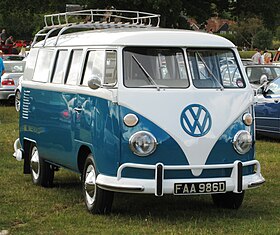Volkswagen Type 2
| Volkswagen Type 2 | |
|---|---|
 |
|
| Overview | |
| Manufacturer | Volkswagen |
| Also called |
|
| Production | Nov 1949–Dec 2013 |
| Body and chassis | |
| Class | Light commercial vehicle (M) |
| Body style | 4/5-door panel van 4/5-door minibus 2-door pickup (regular cab) 4-door pickup (crew cab) |
| Layout | RR layout |
| Platform | Volkswagen Group T platform |
| Chronology | |
| Successor | Volkswagen Type 2 (T3) |
| Volkswagen Type 2 (T1) | |
|---|---|

1966 Volkswagen Type 2
|
|
| Overview | |
| Manufacturer | Volkswagen |
| Production | 1950–1967 (Europe and US) 1950–1975 (Brazil) |
| Assembly |
Wolfsburg, Germany Hanover, Germany São Bernardo do Campo, Brazil Melbourne, Australia |
| Body and chassis | |
| Class | Light commercial vehicle (M) |
| Body style | 5-door panel van 5-door minibus 2-door pickup (regular cab) 3-door pickup (crew cab) |
| Layout | RR layout |
| Platform | Volkswagen Group T1 platform |
| Powertrain | |
| Engine | 1.1 L B4 (petrol) 1.2 L B4 (petrol) 1.5 L B4 (petrol) 1.6 L B4 (petrol) |
| Dimensions | |
| Wheelbase | 2,400 mm (94.5 in) |
| Length | 4,280 mm (168.5 in) |
| Width | 1,720 mm (67.7 in) |
| Height | 1,940 mm (76.4 in) |
| Volkswagen Type 2 (T2) | |
|---|---|
 |
|
| Overview | |
| Production | Aug 1967 – Jul 1979 (Europe and US) 1971–1994 (Mexico) 1976 – Dec 2013 (Brazil) 1981–1986 (Argentina) |
| Assembly |
Hanover, Germany Emden, Germany General Pacheco, Argentina São Bernardo do Campo, Brazil Puebla, Puebla, Mexico Melbourne, Australia |
| Body and chassis | |
| Class | Light commercial vehicle (M) |
| Body style | 4-door panel van 4-door minibus 2-door pickup (regular cab) 3-door pickup (crew cab) |
| Layout | RR layout |
| Platform | Volkswagen Group T2 platform |
| Powertrain | |
| Engine | 1.6 L B4 1.7 L B4 1.8 L B4 1.8 L I4 2.0 L B4 |
| Transmission | 4-speed manual 3-speed automatic |
| Dimensions | |
| Wheelbase | 2,400 mm (94.5 in) |
| Length | 4,505 mm (177.4 in) |
| Width | 1,720 mm (67.7 in) |
| Height | 1,940 mm (76.4 in) |
The Volkswagen Type 2, known officially (depending on body type) as the Transporter, Kombi or Microbus, or, informally, as the Bus (US) or Camper (UK), is a forward control panel van introduced in 1950 by the German automaker Volkswagen as its second car model. Following – and initially deriving from Volkswagen's first model, the Type 1 (Beetle) – it was given the factory designation Type 2.
As one of the forerunners of the modern cargo and passenger vans, the Type 2 gave rise to forward control competitors in the United States in the 1960s, including the Ford Econoline, the Dodge A100, and the Chevrolet Corvair 95 Corvan, the latter adopting the Type 2's rear-engine configuration.
European competition included the 1947-1981 Citroën H Van, the 1959-1980 Renault Estafette (both FF layout), and the 1953-1965 FR layout Ford Transit.
Japanese manufacturers also introduced the platform in different configurations, such as the Nissan Caravan, Toyota LiteAce and the Subaru Sambar.
Like the Beetle, the van has received numerous nicknames worldwide, including the "microbus", "minibus", and, because of its popularity during the counterculture movement of the 1960s, Hippie van/wagon, and still remains iconic for many hippies today.
...
Wikipedia
